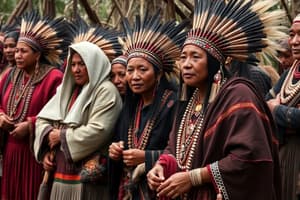Podcast
Questions and Answers
Who is the head of state in Canada?
Who is the head of state in Canada?
- British Monarch (correct)
- Senate
- Prime Minister of Canada
- Governor General
In what year did the British North America Act unite British colonies to form modern Canada?
In what year did the British North America Act unite British colonies to form modern Canada?
- 1783
- 1763
- 1920
- 1867 (correct)
Which European country emerged victorious over control of what would become Canada in 1763?
Which European country emerged victorious over control of what would become Canada in 1763?
- Portugal
- Germany (correct)
- France
- Spain
What type of parliament does Canada have, with a Senate and House of Commons as its chambers?
What type of parliament does Canada have, with a Senate and House of Commons as its chambers?
Which groups of people were the original inhabitants of Canada?
Which groups of people were the original inhabitants of Canada?
How many provinces and territories does Canada have?
How many provinces and territories does Canada have?
Which province is known for being home to the majority of Canada's French-speaking population?
Which province is known for being home to the majority of Canada's French-speaking population?
What is the total area rank of Canada in the world?
What is the total area rank of Canada in the world?
Which indigenous groups continue to shape Canada's identity, politics, and social dynamics today?
Which indigenous groups continue to shape Canada's identity, politics, and social dynamics today?
Flashcards are hidden until you start studying
Study Notes
Overview of Canada
Canada is a vast country with diverse landscapes, cultures, and history. From its northern tundra to the Pacific coast, and from the Atlantic Ocean to the Rocky Mountains, this North American nation has something unique to offer visitors and residents alike. Understanding some key aspects of Canada's indigenous peoples, provinces and territories, geographical features, government structure, and historical background can help paint a comprehensive picture of what makes this country special.
Indigenous Peoples of Canada
The original inhabitants of Canada were various groups of First Nations, Métis, and Inuit people. Their culture, traditions, and beliefs have been integral parts of Canada's heritage since long before European colonization began. Today, they continue to play a significant role in shaping the country's identity, politics, and social dynamics.
Provinces and Territories of Canada
Canada is divided into ten provinces and three territories. Each province and territory has its own distinct characteristics, histories, and cultures. Some of the most well-known provinces include Ontario, Quebec, British Columbia, Alberta, and Nova Scotia, while the most notable territories are Nunavut, Yukon, and Northwest Territories.
Canadian Geography
Canada's geography is as varied as its people. It is the second-largest country in the world by total area, spanning from the Atlantic Ocean in the east to the Pacific Ocean in the west, and from the U.S. border in the south to the Arctic Ocean in the north. The country is known for its abundant natural resources, including vast forests, mineral deposits, and fertile farmland.
Canadian Government Structure
Canada is a parliamentary democracy with a federal system of government. The federal government is responsible for national affairs, while the provinces handle most of the day-to-day operations. The head of state is the British monarch, represented by the Governor General, while the head of government is the Prime Minister of Canada. The political system consists of a bicameral parliament with the Senate and House of Commons serving as the upper and lower houses, respectively.
Canadian History
Canadian history dates back thousands of years, when various Indigenous tribes inhabited the land. European explorers arrived in the early 16th century, and France and England fought over control of the region until 1763, when Britain emerged victorious. The United States gained independence from Great Britain in 1783, leading to Britain's focus on developing its North American colony, which became known as Canada. In 1867, the British North America Act united several British colonies under one federal government, laying the foundation for modern Canada.
From its Indigenous roots to its varied landscape, complex government structure, and rich history, Canada is a dynamic and ever-evolving country. Whether you're exploring its natural beauty, experiencing its diverse cultures, or engaging in its vibrant political scene, there's always something new to discover in this fascinating nation.
Studying That Suits You
Use AI to generate personalized quizzes and flashcards to suit your learning preferences.




